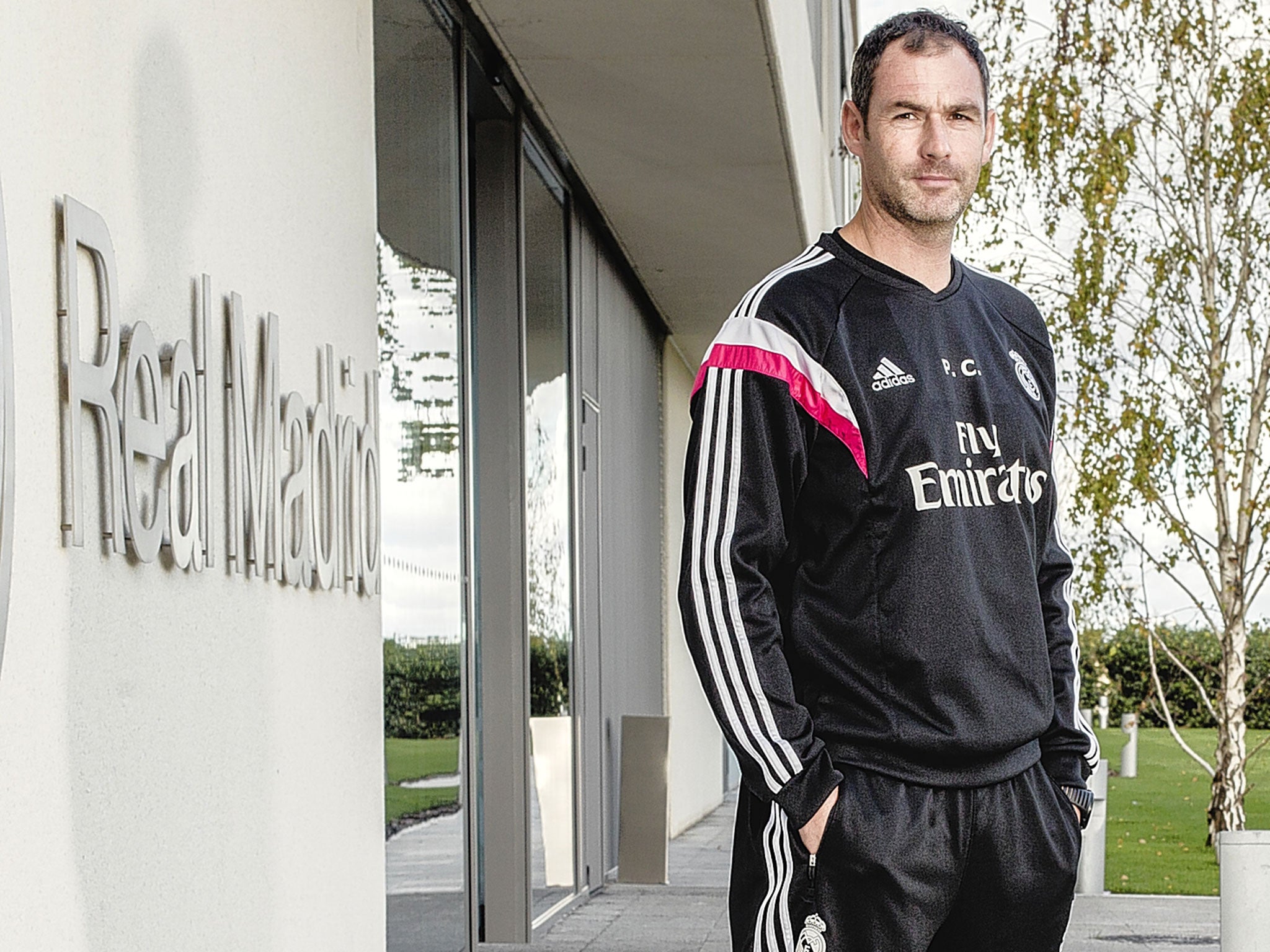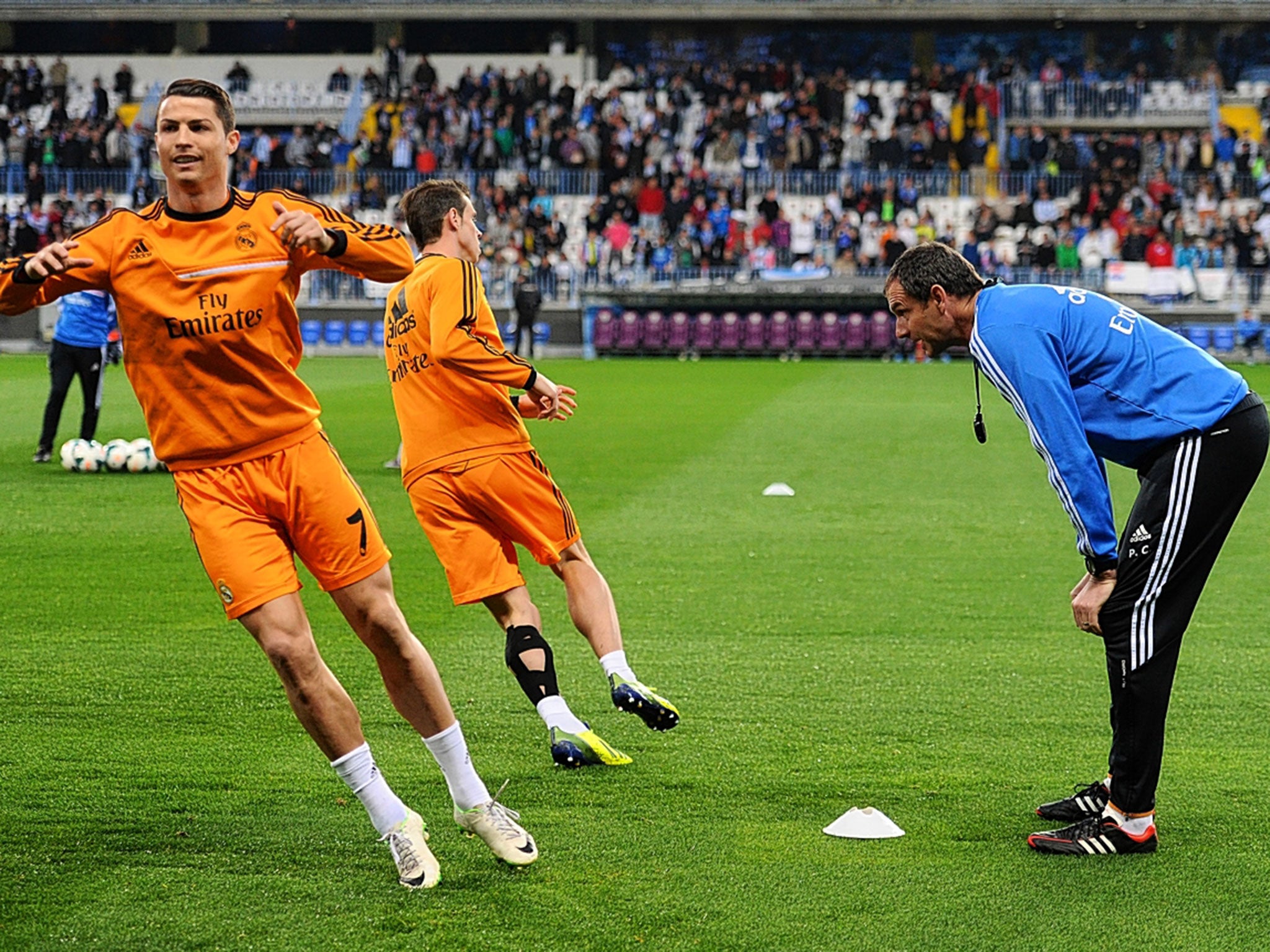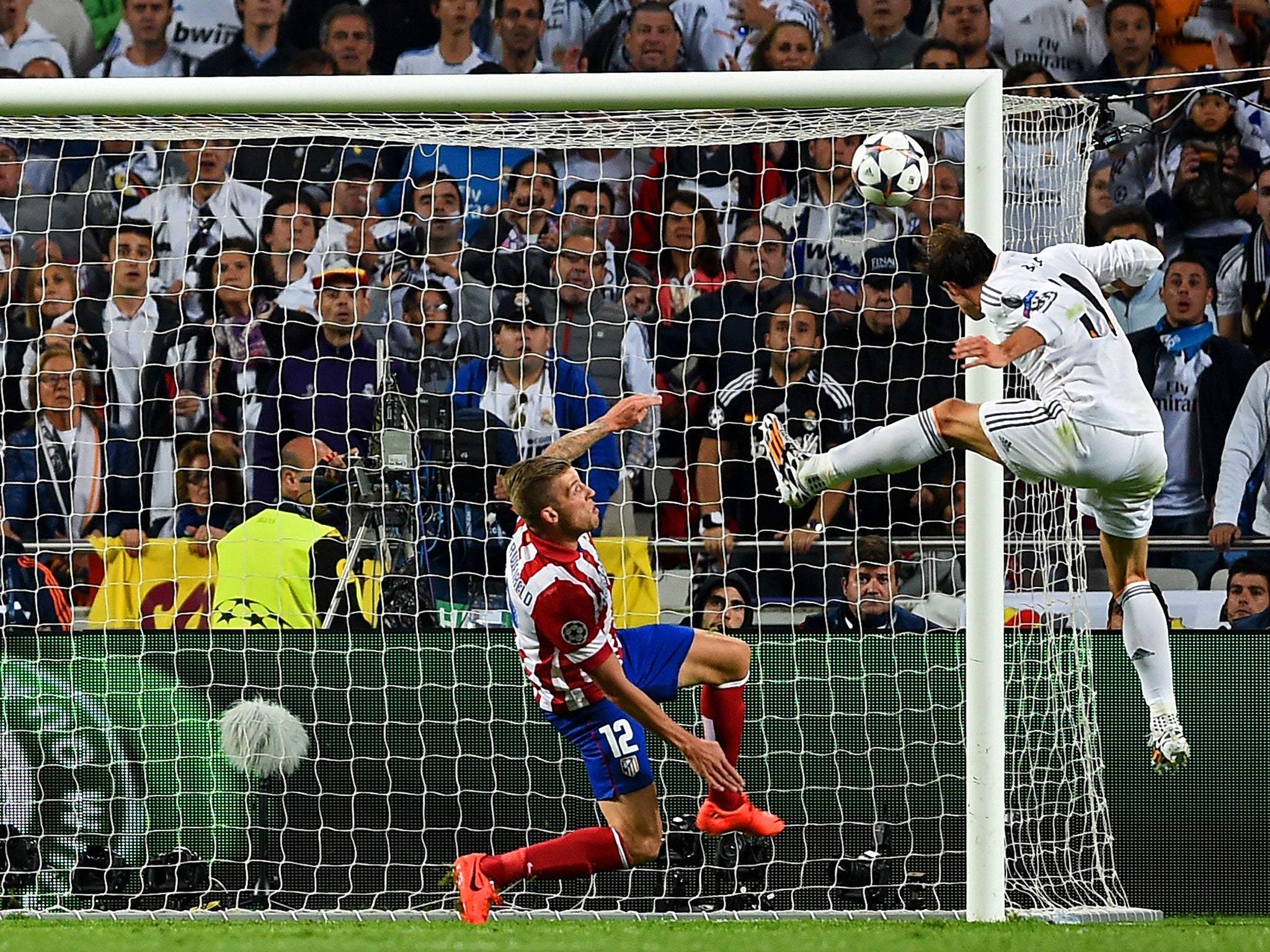Paul Clement interview: Englishman who plotted Real Madrid's European Cup joy
Attention to detail of Paul Clement, Carlo Ancelotti's right-hand man at Real, helped club win La Decima. Now he's in demand but, he tells Pete Jenson, at the moment he's happy picking up trophies and tips

Your support helps us to tell the story
From reproductive rights to climate change to Big Tech, The Independent is on the ground when the story is developing. Whether it's investigating the financials of Elon Musk's pro-Trump PAC or producing our latest documentary, 'The A Word', which shines a light on the American women fighting for reproductive rights, we know how important it is to parse out the facts from the messaging.
At such a critical moment in US history, we need reporters on the ground. Your donation allows us to keep sending journalists to speak to both sides of the story.
The Independent is trusted by Americans across the entire political spectrum. And unlike many other quality news outlets, we choose not to lock Americans out of our reporting and analysis with paywalls. We believe quality journalism should be available to everyone, paid for by those who can afford it.
Your support makes all the difference.Paul Clement will never forget the way his first season at Real Madrid ended in May – with him standing in line behind Zinedine Zidane high in the main stand at the Estadio da Luz waiting to collect a Champions League winner’s medal from Michel Platini.
Carlo Ancelotti and his coaching staff had delivered in one season what the club had been waiting 12 years for – La Decima, a 10th European Cup. As well as his medal, Clement has a match ball from the final at home on the sideboard; the shirt he wore on the night; and the highlights reel for whenever he wants to relive Sergio Ramos’s injury-time equaliser and those three extra-time goals.
“Because we scored so late there was that sense of huge relief and they [Atletico Madrid] were left thinking they so nearly had their hands on the trophy, but if you look at the balance of play, especially in the second half, we deserved to win,” Clement says when we meet at Real’s training ground.
Ancelotti matched Bob Paisley’s record of three European Cups that night in Lisbon and Clement was the first man he embraced on the final whistle. The Englishman in Madrid had completed an impressive first season, winning admirers back home who wonder how much longer he will remain as Carlo’s trusted lieutenant.
“As long as I can. I’m enjoying it tremendously and it’s the chance to win big trophies,” he says. “That doesn’t mean I haven’t got my eye on what I want to do next, which is to try to be a head coach somewhere.”
A former Chelsea youth-team coach, he has seen other members of the Cobham fraternity graduate to management – most notably Brendan Rodgers.
“When we played at Anfield we went into the boot room after the game, so when they played here and then trained here the following morning we all sat down together in my office: Carlo [Ancelotti], Brendan and former sporting director Frank Arnesen,” he recalls. “It was good to talk. When I joined Carlo, Brendan had just left to go out on his own, but we all have that Chelsea connection.”
Home and away wins over Liverpool have been among the highlights of Real’s current winning run – 19 wins going into last night’s meeting with Almeria, the longest ever of any Spanish team – although it sounds as though victory over Barcelona at home in Luis Suarez’s first game satisfied Clement even more.
“They hadn’t conceded a goal when they came here to play us,” he says. “We were a little bit surprised to see Suarez from the start. I thought it was quite a bold selection, with [Lionel] Messi and Neymar, and a midfield of [Andres] Iniesta, Xavi and [Sergio] Busquets. When you see the line-up you can’t help but be impressed and think ‘what a talented team’, but we were able to get the ball past that first line of pressure and then really make those three midfielders defend. Xavi and Iniesta are fantastic players but they are not getting any younger.”
That last comment hints at a failure to rejuvenate at Barcelona, a mistake not made by Real Madrid. With Toni Kroos and James Rodriguez settling into midfield in place of Angel Di Maria and Xabi Alonso, the European champions have at times looked even better this season than last.
“Xabi’s departure was a surprise,” says Clement. “I never saw that coming until the day he told us all, ‘I’ve got this new challenge and I want to accept it’. We were sad to see him and Angel [Di Maria] go because they were good guys and really good players. You are left thinking, ‘That’s a big loss for us’. But then we get fantastic new players coming in.”
Rodriguez has already scored nine goals, one more than Di Maria in all of last season, and Kroos has filled the gap left by Alonso. Their addition and the growing prominence of Isco have enhanced Madrid’s ability to pass their way through teams who defend deep against them, while they retain the counter-attacking potency of Cristiano Ronaldo and Gareth Bale. Opponents are damned if they attack them, and damned if they don’t.
The downside of such a wealth of resources could be a perceived diminishing significance of the coaches: the old argument levelled at Pep Guardiola during his time at Barcelona – “any fool could coach this group of players”. It’s a misconception that forgets the meticulous attention to detail that makes a season a success: the scouting, the session planning, the player monitoring; and the occasions when individual brilliance doesn’t win a game and a set play forged on the training ground does.

“We have scored 10 goals already from attacking corners,” says Clement. “Ten!” It is already more than they scored last season and nine more than Barcelona, who took over 100 corners before their first goal from one came last week against Espanyol.
“Taking care of the details” would come close to a job description for Clement.
He manages a team of six analysts who scout opponents months in advance, compiling reports and preparing video and graphics which are then presented to the players. And he oversees the management of data that helps anticipate injury.
“In every session the players all wear GPS units on their vests fitted with small accelerometers to measure running speed, intensity, distance, and false discrepancy off left or right foot so we can start seeing how they might be over-compensating on one side of the body. If there is an issue and doctors diagnose, let’s say, some hamstring tightness then we can put a red tick next to the player and pull him out of some sessions. It’s all about taking preventive measures, rather than ‘bam!’ hamstring gone, out for three weeks!
“The trouble is there is so much data now, and you need people to make sense out of it, so we don’t take away the importance of the human eye. A good coach can spot someone who is not comfortable. Speaking to the player is still extremely important.”
Clement says he wants honesty from players during those discussions, although he can’t hide his admiration for the old-school desire to play on regardless.
“Frank Lampard would play with his ankle the size of a balloon. Alvaro Arbeloa is similar here. There are other players who are more, ‘Ah, no, I don’t feel quite right’. But we respect that because above all we want them to be able to perform.”
Despite all best efforts, a player can still go away on international duty and pick up an injury that rules him out for three months, as happened two weeks ago with Luka Modric. So far his absence, and that of James Rodriguez until the new year, have not stopped the winning run. Squad players have stepped up.
“Carlo is very good at making sure that whether you are going to play for one minute or 90 minutes you are fully focused,” says Clement, going on to illustrate the point by citing Alvaro Morata’s cameo in the Champions League final. “He had hardly played during the season but was then involved in five of the most important minutes of the year.”
Clement believes that ultimately it is this group of players’ professionalism, as much as their talent, that sets them apart. “The level here is so high, both physically and technically, and it just continues to improve with James and Kroos coming in. But they are also tremendously competitive. We can be doing a shooting drill and they’ll say, ‘Let’s make this into a competition’. It’s the same with the keep-ball exercises and the passing drills.
“When the final whistle goes in one of those small-sided games there is always a massive cheer going up from the team that has won the match. And the ones that haven’t won, their heads will go down and they’ll get straight in to change, really disappointed: ‘Lost the game today, got to win it tomorrow’.”
Clement knows this level of excellence will be hard to find elsewhere. But that will not curb his determination to cultivate the same habits as much as possible wherever he goes.
He is drinking all this in, contributing enormously but also looking, learning and taking from every source of inspiration. He has just finished reading Win Forever by Pete Carroll, the head coach of the American football team Seattle Seahawks. The title is apt in view of Real’s winning run. The author could also serve as a role model – a modest player who worked hard to climb the NFL’s coaching ladder and won the Super Bowl last February aged 62.
“The principles of leadership don’t really change across sports,” Clement says. “And there are so many great stories about how coaches who have gone on to become head coaches have been shaped by difficulties they experienced earlier on.”
His own role has changed drastically. “I was still pumping the balls up right up to when I was the assistant coach of Republic of Ireland. There is a vast difference between working with a big team and previous jobs when I was the coaching staff.”
That massive jump from coaching kids to superstars has been safely negotiated to the point where everything now feels “normal”.
“There was a certain amount of anxiety when I first started working with the first team at Chelsea, having stepped up from the youth academy. I was working with some big characters and some big players and that was a really uncomfortable time.
“But it took me out of my comfort zone and when I went to the next place it became that little bit easier. I was still a bit anxious but players’ reputations usually have nothing to do with the reality.

“Working with Zlatan Ibrahimovic was totally different to what I had expected. He is a fantastic professional and a leader, somebody you would happily go into the trenches with. Ronaldo here is exactly the same.”
Experience in Spain and France means that when the big chance comes it will not necessarily be back in England. When David Moyes called him for advice about the Real Sociedad job recently he was full of praise for La Liga.
“He will enjoy the way teams really try to play football here. The Premier League can be a bit crash, bang, wallop at times. Not necessarily at the top end, but from mid-table down.”
England might also be the hardest place for Clement to be given his chance. “The Premier League is a global game in terms of recruiting players and it has become global in terms of recruiting managers too,” he says.
He was desperate for Liverpool to progress in Europe, both for the club and their manager. “It is nice to see Brendan getting an opportunity at a big European club, and long may that continue. I want him to be successful because that will help people like me get that next opportunity.”
The level of rumoured suitors continues to rise steadily for Clement. Where once he was linked with Brighton and Queen’s Park Rangers, the talk now has him on Arsenal’s radar.
What he will not allow himself to do is let thoughts about the next job distract from the next game. Tomorrow Real fly to Morocco for the World Club Championships. On Monday they will learn who they will face in the Champions League.
I remind him that last season he tipped Arsenal and Manchester City to be stronger than a transitional Chelsea. “Well, I got that wrong, didn’t I? They reached the semi-finals! Now they definitely look the strongest of the four.”
If Real Madrid win the tournament they will become the first side to defend the Champions League title successfully. “No one has spoken about that,” says Clement. “The players know if you keep looking after the small details you are going to end up in a good place. Take care of the journey and usually the destination will take care of itself.”
For a coach in ever-increasing demand, that sounds like good career advice too.
Join our commenting forum
Join thought-provoking conversations, follow other Independent readers and see their replies
Comments